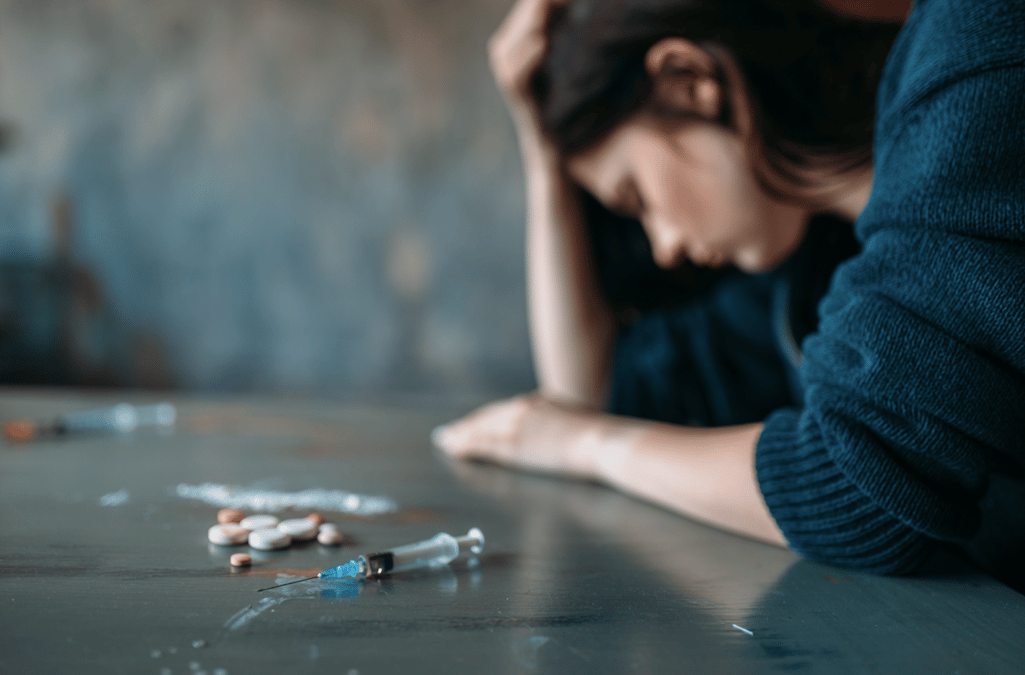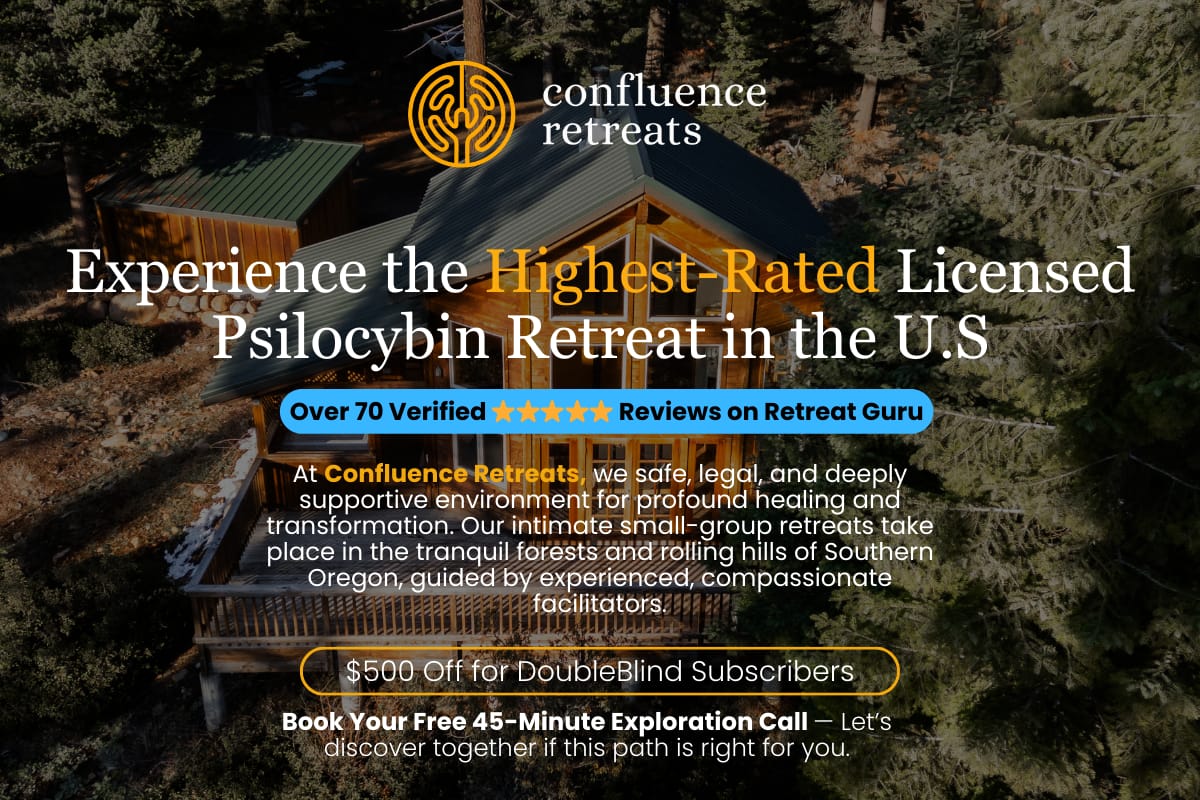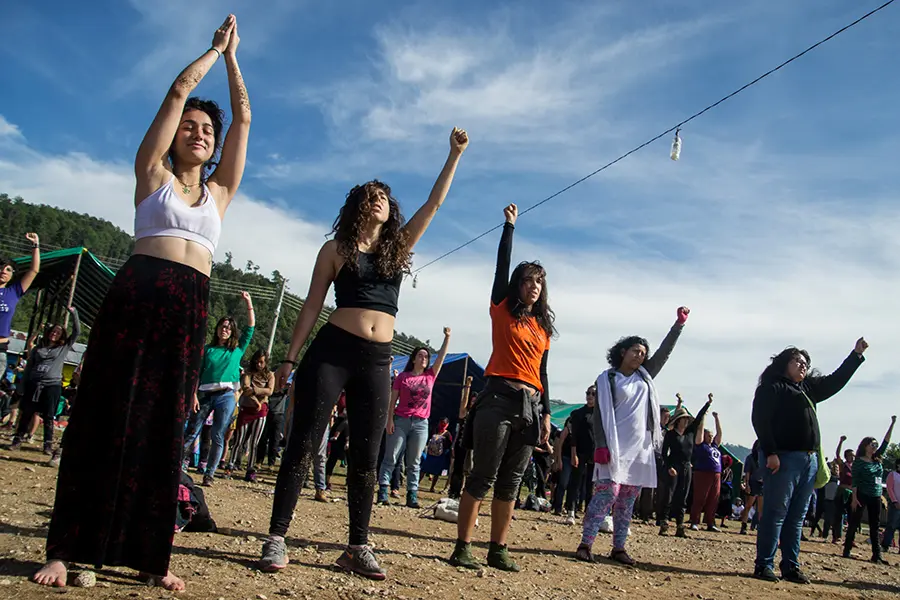- The Drop In by DoubleBlind
- Posts
- Why Psychedelics Are Emerging as a Powerful Tool for Recovery
Why Psychedelics Are Emerging as a Powerful Tool for Recovery
PLUS: Should psychedelic researchers disclose personal use of the drugs they study?

POWERED BY
Good morning and welcome to another edition of The Drop In, DoubleBlind’s newsletter delivering independent journalism about psychedelics straight to your inbox. We're kicking things off with a story about a topic that remains controversial to the mainstream: Psychedelics disrupting the cycle of addiction and offering a new way forward in recovery.
Here's the tea: Psychedelics are being studied as potential lifelines for people living with addiction, and the conversation is getting hot. Danielle Nova and Daniel Shankin are co-founding a brand-new summit, Beyond Addiction, to bring together science, recovery stories, and hard conversations about substances like ibogaine. And Grammy-winning singer-songwriter Melissa Etheridge is putting her weight behind the research. Why? Because — psychedelics or not — recovery needs a facelift, and we need real answers as to whether they can disrupt addiction.
We drop in on this, and so much more, below.
Happy lunar eclipse🌙,
Mary Carreón
Editor-in-Chief
Together With Confluence Retreats
The questions you’re carrying…
Doubts often arise before a psilocybin journey: Am I ready? What if I lose control? What if nothing changes?
At Confluence, a licensed nonprofit psilocybin retreat in Oregon, these questions are met with care. Every participant is guided through personal preparation—a private 1:1 session, a small-group call, and access to Nectara’s psychedelic client care platform. Afterward, support continues with additional 1:1s and microdosing education and coaching, so your journey doesn't stop after the retreat.
A free Exploration Call is a space to bring those questions forward, talk them through with a licensed facilitator, and see if this path feels right.
For DoubleBlind readers only: the first 10 people to book a call will receive a $500 discount code; the next 15 will receive $250. First-come, while codes last.
Simply enter your name and email, then book your free call.
Featured

Can Psychedelics Help People Break Free from Addiction?
Psychedelics are being studied as lifelines for people seeking freedom from addiction, and next week’s Beyond Addiction conference invites you into the conversation.
Psychedelics have carried a stigma for more than 55 years, which is why stories of recovery that begin with them are often met with disbelief and suspicion. But there’s a quickly growing movement around psychedelics and addiction, and next weekend you’ll be able to actively participate in the conversation. Beyond Addiction, a four-day online conference running September 19–22, will gather clinicians, researchers, and people in recovery to probe a once-taboo question: Can psychedelics actually help interrupt the cycles that keep people hooked on opioids, methamphetamine, cocaine, alcohol, and even cigarettes?
The conference is co-founded by Danielle Nova, Executive Director of the San Francisco Psychedelic Society and founder of Psychedelic Recovery, alongside Daniel Shankin, founder of Tam Integration and its widely respected integration circles and training programs. For Nova, the inspiration to bring this event to life is personal. After years of being prescribed psychiatric medications and struggling with dependency on substances like opioids, she was exhausted. She says she didn’t think change was possible until psychedelics interrupted the cycle and offered her a glimpse of a different life.
“It wasn’t just one session that transformed the addiction,” she told DoubleBlind. “It was a whole program that I created for myself, but it really interrupted that process of addiction. And I remember, after doing ayahuasca for the first time, she said [to me], ‘I’m going to show you a new way.’ I have like shivers sharing this. It was the first time that I could really believe that I could live life beyond addiction.”
That experience shapes her vision for the summit, which is ultimately to organize information on the impact psychedelics can have on addiction into one summit combining research, practitioner experiences, and real-world stories all in one place. “I want this summit to be a resource for individuals, for practitioners, for families… for people to know that there are more options out there besides just total abstinence for addiction recovery,” Nova said.
For her, recovery is not just about abstaining; it’s about transcending the compounded psychological, emotional, and physical layers tethering people to substances.
“Where I think psychedelics are so powerful is that not only are they a tool for regulation, but they're a tool for transformation and growth and really facing our shadows and alchemizing our shadows into empowerment,” she said.
If you’re following the ibogaine conversation — which is currently the gravitational center of the conversation around psychedelics and addiction — all of this might sound familiar. Derived from the root bark of a West African shrub, ibogaine has drawn attention for its ability to massively reduce withdrawal symptoms and cravings in people living with opioid dependence. Observational research suggests it can blunt the acute pain of detox and deliver a kind of neurological reset, giving people a window of time to get off of highly addictive drugs like heroin, fentanyl, and other popular opioids.
In Spain, a clinical trial supported by the Etheridge Foundation, Melissa Etheridge’s non-profit that funds psychedelic research (more on that in a sec), has shown encouraging early results, with participants reducing or even eliminating their dependence on methadone.
But ibogaine has other purported benefits outside of breaking opioid addiction. A 2024 Stanford Medicine study found that veterans who underwent ibogaine therapy reported marked improvements in PTSD, depression, and anxiety, along with functional gains that lasted at least a month. In Texas, Governor Greg Abbott signed SB 2308 this summer, dedicating up to $50 million in state funds for ibogaine research on veterans with brain injuries and substance use disorders. With unlikely champions like former governor Rick Perry, Texas is officially at the forefront of psychedelic medicine policy, even as ibogaine remains federally illegal.
Back to Melissa Etheridge. The Grammy-winning singer-songwriter has become a benefactor of psychedelic research at the intersection of plant medicine and addiction. She was motivated to find solutions to addiction after losing her oldest son in 2020 to an opioid overdose after he became dependent on painkillers following an accident. Enduring this tragedy thrust her into advocacy.
“I lost our oldest son about five years ago to an opioid addiction,” Etheridge told DoubleBlind in a phone interview. “After my son died, I just really felt deeply that [psychedelic medicine] could have helped him, if there was a pathway for him to do it in a legal, medical context.”
Through the Etheridge Foundation, she has become one of the most visible patrons of psychedelic research. “One of the first things we invested in… was ibogaine research in Spain,” she said. “The results were, not only did [the study participants] get off methadone, they got off of smoking and drinking, and they changed their lives. For Etheridge, funding science is her way of doing something about the opioid crisis. “There was no one raising money for data on this. And I felt like that was a place that I could put my energy and help fill a gap.”
But the use of psychedelics in addiction treatment is hardly a settled matter. Critics argue that turning to these substances risks swapping one dependency for another, or that it’s glamorizing risky, unsupervised use. A panel at Harvard Medical School recently stressed that psychedelic therapy should not replace evidence-based medications like methadone or buprenorphine, which remain the gold standard for opioid-use disorder.
Additionally, the rapid spread of ketamine clinics (especially the telehealth variety) has only sharpened concerns about misuse. Proponents counter that most psychedelics have low addiction potential (ketamine aside; it is not a classic psychedelic), especially when administered in structured, clinical, or ceremonial contexts with integration support. Etheridge quickly pointed out that ibogaine is “so powerful” it is not a recreational drug; rather, it is “straight medicine.”
But intention and agency are everything. Whether someone turns to psychedelics as a way to avoid reality or truly change is up to the individual. ”[Psychedelics] can be used as a mechanism of avoiding and trying to escape,” Nova said. “It really comes down to the choice someone wants to make with these tools. Do they want to interrupt a cycle? Are they wanting to use them… for really looking at themselves and taking control and having sovereignty over their reality, and using them as a guide and a tool for transformation, rather than just some type of trap keeping them in a perpetual state of suffering?”
That is why the scientific research matters so much. A 2023 review in Frontiers in Psychiatry concluded that psilocybin, LSD, ayahuasca, and ibogaine all show promise across a range of substance use disorders, particularly alcohol and tobacco, but emphasized the need for larger, controlled studies. For Danielle Nova, the data only confirms what she and others in recovery have already experienced.
“People don’t get addicted to drugs because the drugs are addictive per se. They get addicted… because there's some part of the drug that works — whether that's providing them connection or disassociation from the pain,” she said. “That’s why integration is so important, because you need more than just the window [of time without withdrawal]. You need a plan.”
Dr. Jim Fadiman, the godfather of the modern microdosing movement, explains that no one intends to become addicted. Leaning on drugs is often a way to manage the emotional fallout from difficult life dynamics.
“Each person uses this or that drug to lessen their suffering, be it childhood trauma, loneliness, a terrible current life situation, or many kinds of physical pain,” Dr. Fadiman told DoubleBlind in an email. “The tragedy is that the drugs or pharmaceuticals almost work. The ones that are illegal and the ones prescribed by physicians follow the same initial path. They do make one feel better in the short run. But like a relationship that starts wonderfully and becomes abusive, eventually they become a cure worse than the condition they were supposed to fix.”
With overdose deaths continuing to rise and treatment systems stretched thin, psychedelics offer a glimmer of possibility that is both controversial and deeply compelling. Whether through Nova ad Shankin’s work building global peer-support networks or Etheridge’s funding of groundbreaking studies, the movement rests on a belief that addiction can, at least for a moment, be interrupted.
And sometimes, a moment is all it takes for lasting change.

Sneak Peek
Is It Safe to Use MDMA with Viagra or Cialis?
Mixing MDMA with Viagra or Cialis might sound risky, but the reality is more nuanced.
MDMA, or Molly, is often referred to as the “love drug,” but when it comes to sex, the story gets complicated. Add Viagra or Cialis into the mix, and things get even murkier. So is combining them safe—or just asking for trouble?
Upgrade your subscription here to get the story on Friday.
& More Must-Reads

DoubleBlind Digs
Next week in NYC, PSYCA launches Climate-Consciousness Week with the Climate, Consciousness & Mental Health Summit at NeueHouse (Sept 17, 5–10 pm)—a one-night kickoff of talks, rituals, and breakouts linking inner healing to systems change, with ways to get involved all week. Learn more here!
Musician East Forest is going to be performing live shows this month! Catch Krishna in Santa Monica, Ventura, Brooklyn, Australia, and more. Get tickets here!
The Beyond Addiction Conference (Sept 19–21) brings clinicians, researchers, and people in recovery together online to explore how psychedelics might help interrupt cycles of dependence—from opioids to alcohol—through science, personal stories, and tough conversations about what recovery can look like. Learn more and buy tickets here!
Planning to take a psychedelic soon? The Carhart-Harris Lab at UCSF just launched a quick online survey open to anyone preparing for a journey—whether at home, a retreat, or even a festival. Learn more here.
Together With Confluence Retreats
Not sure if you’re ready?
At Confluence, a licensed nonprofit retreat in Oregon, preparation and integration are part of the journey—from private 1:1s to microdosing coaching. A free Exploration Call is your chance to talk it through with a licensed facilitator.
For DoubleBlind readers only: the first 10 to book receive $500 off; the next 15, $250. See details here.
(Simply enter your name and email, then book your free call)

Around the Web
Four hikers in Upstate New York had to be rescued over Labor Day weekend after getting lost on psilocybin mushrooms and experiencing what officials called a “debilitating high.” Read more here.
FDA just made its rejection of Lykos Therapeutics’ MDMA bid public. Read more here.
Do we trust Kellyanne Conway? Former Trump Advisor Kellyanne Conway Is the 'Biggest Champion' of Marijuana Rescheduling in the President’s Inner Circle, GOP Congressman Says. Read more here.
A groundbreaking JAMA-published study found that just one high dose of LSD (100 µg) rapidly reduced anxiety in people with generalized anxiety disorder—with nearly half entering remission within three months—and did so without the need for psychotherapy. Read more here.
The U.S. Coast Guard has seized over 40,000 pounds of cocaine (lol, damn!) in the Eastern Pacific as part of its escalated Operation Pacific Viper, accompanied by shocking images of crew members standing watch over a burning smuggler vessel…a dramatic snapshot of one of the largest interdiction efforts in recent memory. Read more here.
How was today's Drop In? |
💌 If you loved this email, forward it to a psychonaut in your life.








Reply